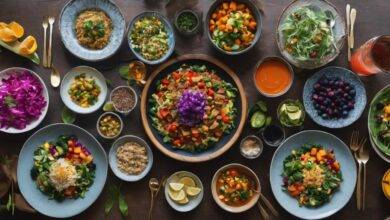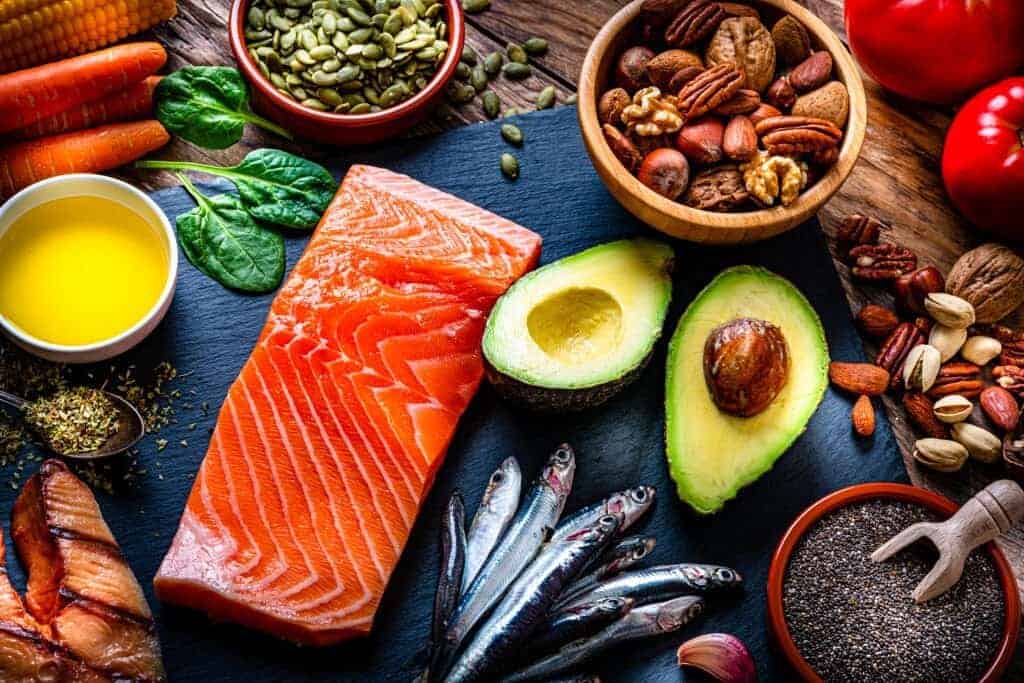Anti-Inflammatory Foods and Diets: Ultimate Guide
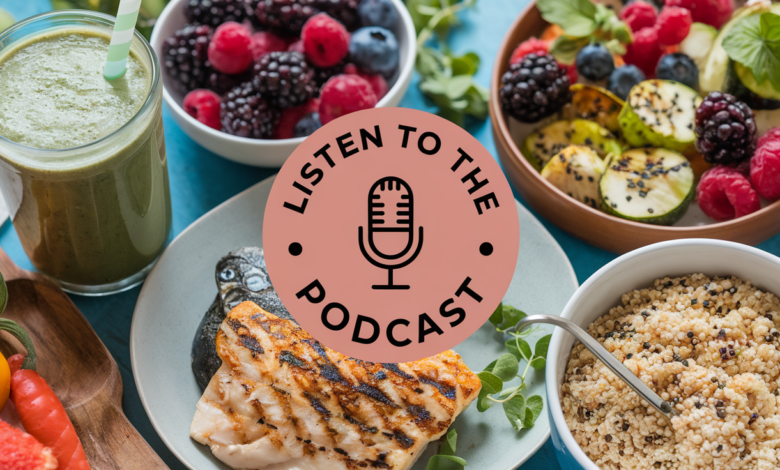
Anti-Inflammatory foods can assist in your daily life. Inflammation is a natural response by our body to protect against harm. When it becomes chronic, it can lead to health issues. An anti-inflammatory food can help combat this problem and promote well-being. Let’s explore anti-inflammatory food & diets to help you make good choices for your health. We’ll look at the science behind inflammation, give practical diet advice, and talk about lifestyle factors that can help reduce inflammation.
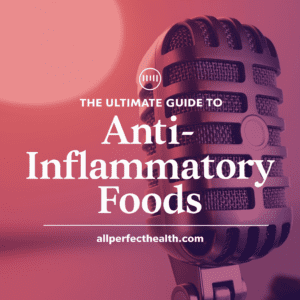
December 28, 2024 ·
Ultimate Anti-Inflammatory foods & diets
12 Min, 46 Sec · By All Perfect Health
#005: In this episode of All Perfect Health, we dive into the science and practical strategies behind anti-inflammatory foods and diets. Discover how incorporating foods like fatty fish, berries, leafy greens, nuts, and grass-fed beef can help reduce inflammation, boost energy, and promote overall health. We explore the role of omega-3s, antioxidants, and essential vitamins in fighting chronic inflammation and discuss how to tailor an anti-inflammatory lifestyle to your needs. Whether you’re battling inflammation-related issues or just looking to enhance your wellness journey, this episode is packed with actionable tips and expert insights. Tune in and take the first step towards a healthier, inflammation-free life!
Understanding Inflammation and Its Impact
Inflammation is our body’s way of fighting infections and healing injuries. While short-term inflammation is good, long-term inflammation can be harmful. It’s connected to health problems like heart disease, diabetes, and some cancers. By eating an anti-inflammatory diet, we can help lower the risk of these conditions and improve our health. Long-term inflammation is often called “silent inflammation” because it can last for years without being noticed, slowly damaging our body. Understanding what causes inflammation, like poor diet, stress, and things in our environment, is important for fighting it effectively.
Key Takeaways: Anti-Inflammatory Diet Essentials
Key Points: Anti-Inflammatory Diet
- Focus on whole, minimally processed foods
- Eat lots of colorful fruits and vegetables
- Include fatty fish rich in omega-3s
- Choose healthy fats like olive oil
- Add herbs and spices like turmeric and ginger
- Limit processed foods, added sugars, and unhealthy fats
- Consider Mediterranean or plant-based eating styles
- Combine diet with other healthy habits like exercise and sleep
Power-Packed Anti-Inflammatory Foods
Some foods are known to fight inflammation. Let’s look at some top choices:
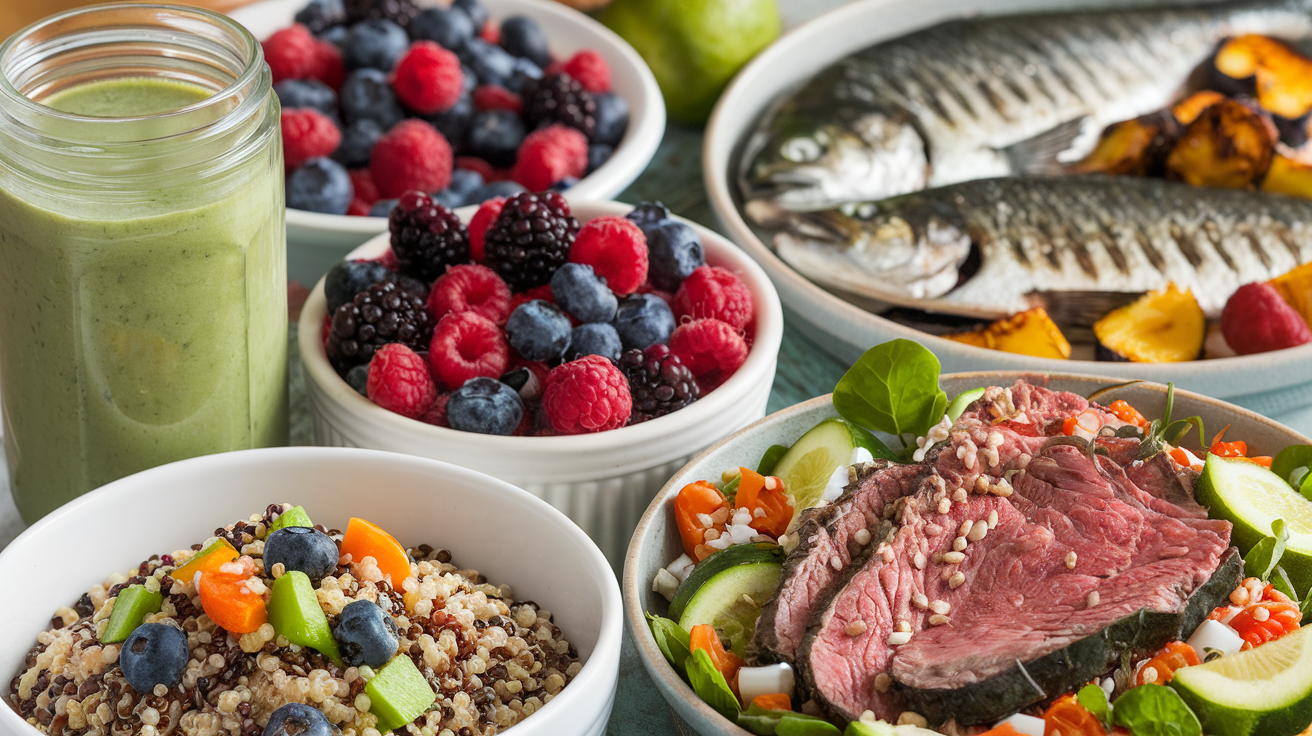
1. Berries
Berries like strawberries, blueberries, and raspberries have lots of antioxidants called anthocyanins. These help reduce inflammation and may lower your risk of diseases. Try adding berries to your breakfast cereal or yogurt. Berries can also help improve memory and brain function, making them good for your brain. They’re also high in fiber, which helps your digestion and keeps your blood sugar steady.
2. Leafy Greens
Spinach, kale, and collard greens have vitamins and minerals that fight inflammation. These greens have antioxidants that protect your cells from damage. Add these to your meals in salads, smoothies, or as a cooked side dish. Leafy greens have a lot of vitamin K, which helps your blood clot and keeps your bones healthy. They also have folate, which is important for making DNA and helping cells divide, making them especially good for pregnant women.
3. Fatty Fish
Salmon, mackerel, and sardines have lots of omega-3 fatty acids. These healthy fats are great at fighting inflammation. Try to eat fatty fish at least twice a week. Omega-3s help reduce substances in your body that cause inflammation. They may also help lower your risk of heart disease, depression, and autoimmune problems.
4. Beef
Beef is an anti-inflammatory rich in high-quality protein, iron, zinc, and B vitamins. Grass-fed beef, in particular, contains higher levels of omega-3 fatty acids and conjugated linoleic acid (CLA), which help reduce inflammation and support overall health. Incorporate lean cuts of beef into your meals for a powerful addition to your anti-inflammatory diet.
5. Nuts and Seeds
Walnuts, almonds, chia seeds, and flaxseeds have healthy fats and antioxidants. They can help reduce inflammation and give you important nutrients. Snack on a handful of nuts or sprinkle seeds on your salads and yogurt. Nuts and seeds also have plant protein and fiber, which can help you manage your weight and blood sugar. They make a filling snack that can help you feel full and promote good health.
The Anti-Inflammatory Diet Approach
An anti-inflammatory diet isn’t about strict rules, but about making smart food choices. Here are some key ideas and diets that can help reduce inflammation:
Mediterranean Diet
The Mediterranean diet is often considered one of the best anti-inflammatory eating plans. It includes:
- Lots of fruits and vegetables
- Whole grains
- Lean proteins, especially fish
- Healthy fats like olive oil
- Limited processed foods
This way of eating has been linked to less inflammation and lower risk of chronic diseases. Learn more about the Mediterranean diet and other healthy eating approaches. The Mediterranean diet isn’t just about food; it also includes regular exercise and enjoying meals with family and friends. This complete approach to eating and living has been linked to better heart health, better brain function, and living longer.
Plant-Based Eating
A diet with lots of plant foods can also help fight inflammation. You don’t have to become vegetarian, but try to include more fruits, vegetables, beans, and whole grains in your meals. These foods have antioxidants and fiber, which help reduce inflammation. Plant-based diets can improve gut health by helping good bacteria grow in your digestive system. This can help your immune system and reduce inflammation throughout your body. Plant-based diets often have fewer calories and unhealthy fats “seed oils”, which can help manage weight and reduce inflammation related to being overweight.
Foods to Limit on an Anti-Inflammatory Diet
While it’s important to know what to eat, it’s also important to know what foods to eat less of. Some foods can increase inflammation in the body:
- Processed and ultra-processed foods
- Refined carbohydrates (white bread, pastries, pasta)
- Sugary drinks, energy drinks
- Seed Oils, Trans fats “Vegetable Oils”
Eating less of these foods can help lower inflammation and improve your health. You don’t have to completely stop eating these foods but try to eat them less often and in smaller amounts. When you do eat these foods, pay attention to how much you’re eating. For example, when you have sweets or processed snacks, have smaller portions and balance them with healthier foods throughout the day.
Lifestyle Factors for Reducing Inflammation
While diet is important for fighting inflammation, other lifestyle factors matter too:
Regular Physical Activity
Exercise can help reduce inflammation in the body. Try to get at least 150 minutes of moderate exercise or 75 minutes of vigorous exercise each week. This could include activities like brisk walking, cycling, or swimming. Including exercises like leg lifts can also be good for overall fitness. Regular exercise has been shown to reduce signs of inflammation in the blood. Exercise also helps maintain a healthy weight, which is important for managing inflammation, as extra body fat can contribute to long-term, low-level inflammation.
Stress Management
Long-term stress can contribute to inflammation. Try stress-reduction techniques like meditation, yoga, or deep breathing exercises. These can help calm your mind and reduce inflammation in your body. Mindfulness practices have been shown to lower levels of cortisol, the body’s main stress hormone, which can contribute to inflammation when it stays high for a long time. Doing hobbies, spending time in nature, or talking with friends can all help manage stress and reduce inflammation.
Quality Sleep
Getting enough good sleep is important for managing inflammation. Aim for 7-9 hours of sleep each night. Create a relaxing bedtime routine and make sure your bedroom is comfortable for sleeping. Poor sleep has been linked to increased inflammation in the body. Try to go to bed and wake up at the same time each day, limit screen time before bed, and make your bedroom cool and dark for better sleep. If you have trouble sleeping, talk to a doctor for personalized advice.
Special Considerations for Anti-Inflammatory Diets
While an anti-inflammatory diet can benefit most people, it’s important to think about individual needs:
Personalized Nutrition
Everyone’s body responds differently to foods. What works for one person may not work for another. It’s important to listen to your body and adjust your diet as needed. Consider keeping a food diary to track how different foods affect you. Some people may have specific food sensitivities or allergies that can cause inflammation, even if the food is generally considered healthy. Pay attention to how your body reacts to different foods and make changes as needed. Working with a dietitian can help you create a personalized anti-inflammatory eating plan that fits your needs, likes, and health goals.
Consulting Healthcare Professionals
Before making big changes to your diet, especially if you have health conditions, it’s a good idea to talk to a doctor or dietitian. They can give you personalized advice and make sure your diet meets all your nutritional needs. This is especially important if you have chronic health conditions, take medications, or have a history of eating disorders. A healthcare professional can help you understand how foods might interact with medications, and make sure that your anti-inflammatory diet is safe and effective for you.
Conclusion: Embracing an Anti-Inflammatory Lifestyle
Adopting an anti-inflammatory diet isn’t about following strict rules or depriving yourself. It’s about making informed choices that nourish your body and promote long-term health. By focusing on whole, nutrient-dense foods and limiting processed options, you can help reduce inflammation and lower your risk of chronic diseases. Remember that an anti-inflammatory lifestyle is more than just diet; it includes regular physical activity, stress management, quality sleep, and overall mindful living.
Small changes can make a big difference. Start by adding more anti-inflammatory foods to your meals and gradually reducing inflammatory ones. Combine these dietary changes with regular exercise, stress management, and good sleep habits for a complete approach to health. Be patient with yourself as you make these changes, and don’t try to be perfect. Even small improvements in your diet and lifestyle can have big long-term benefits for your health.
An anti-inflammatory lifestyle is a journey, not a destination. Be patient with yourself and celebrate the small victories along the way. Your body will thank you for the positive changes you’re making. As you continue on this path, you may notice improvements in energy levels, mood, and overall well-being. Keep in mind that the benefits of an anti-inflammatory lifestyle often go beyond just physical health; they can positively impact mental clarity, emotional balance, and overall quality of life. Here’s to your health and well-being!
Anti-Inflammatory Foods FAQ
What is the strongest anti-inflammatory food?
The strongest anti-inflammatory food is widely considered to be fatty fish, such as salmon, mackerel, and sardines. These are rich in omega-3 fatty acids, which have powerful anti-inflammatory properties. They help reduce inflammatory markers in the body and lower the risk of chronic diseases, including heart disease and arthritis.
Which foods help reduce inflammation?
Many foods are known for their anti-inflammatory benefits, including:
- Berries: Rich in antioxidants like anthocyanins.
- Leafy Greens: Spinach, kale, and collards are packed with vitamins and antioxidants.
- Fatty Fish: Salmon, mackerel, and sardines provide omega-3 fatty acids.
- Nuts and Seeds: Walnuts, almonds, flaxseeds, and chia seeds offer healthy fats and antioxidants.
- Beef: Grass-fed beef contains omega-3s and conjugated linoleic acid (CLA).
How do you flush inflammation out of your body?
Reducing inflammation involves adopting a healthy lifestyle that includes:
- Eating Anti-Inflammatory Foods: Focus on whole, nutrient-dense foods like fatty fish, leafy greens, berries, and nuts.
- Staying Hydrated: Drink plenty of water to help your body remove toxins.
- Getting Regular Exercise: Physical activity helps reduce inflammation and supports overall health.
- Getting Enough Sleep: Poor sleep can increase inflammatory markers in the body.
- Managing Stress: Practices like meditation, yoga, or deep breathing can reduce stress-related inflammation.
What can I drink to cure inflammation?
Certain beverages can help combat inflammation, including:
- Green Tea: Contains antioxidants like EGCG that reduce inflammation.
- Turmeric Tea: Rich in curcumin, a compound known for its anti-inflammatory effects.
- Bone Broth: Packed with collagen and amino acids like glycine, which support gut health and reduce inflammation.
- Water: Staying hydrated helps your body flush out toxins and reduce inflammation.
- Tart Cherry Juice: Contains anthocyanins, which can help reduce muscle soreness and inflammation.
If you have specific dietary needs or health concerns, consult with a healthcare provider to tailor your anti-inflammatory approach effectively.



